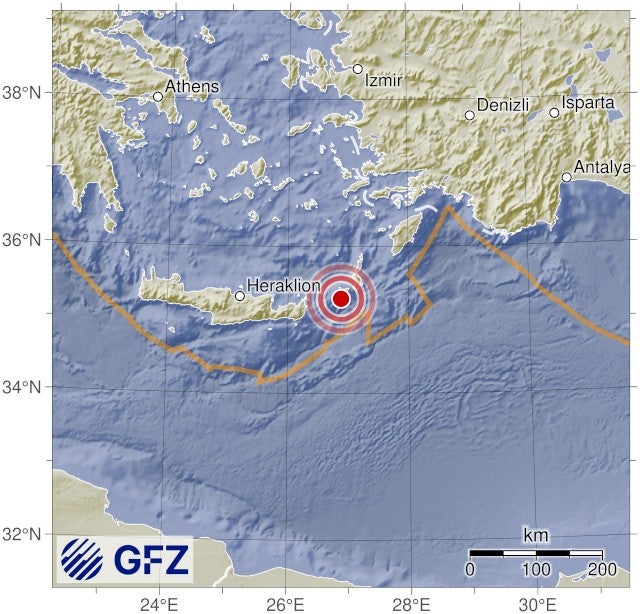ARTICLE AD BOX
An earthquake with a magnitude of 5.9 struck off the eastern coast of Crete, Greece’s largest island, in the early hours of Wednesday morning, which was felt as far away as Egypt.
The quake hit near the islands of Kasos and Karpathos, smaller islands near Crete’s east coast in the Mediterranean Sea, with a depth of 35km (22 miles), the Athens Geodynamic Institute said.
No damage or injuries have been reported, but Greek authorities have issued a tsunami warning in the area.
Crete is a popular holiday destination due to its pristine beaches, thriving resort scene, rich history and unique natural landscapes, but the island also happens to be one of the most earthquake-prone in Europe.
Here is what we know so far about the earthquake.
Is it safe to travel to Crete, Greece?
Greece’s Ministry for Climate Crisis and Civil Protection said on X: "A magnitude 5.9 earthquake occurred 48km SE of Kasos. Risk of a possible Tsunami in your area. Move away from the coast immediately. Follow the instructions of Local Authorities."
The UK’s Foreign, Commonwealth & Development Office currently does not have any travel advice regarding Crete or Greece as a whole, meaning it should be safe to travel to the country and its islands.
Those who are planning a trip to the east coast of Crete, Karos or Karpathos can check for updates from Greek authorities.
No injuries or serious property damage have been reported since the earthquake occurred, but authorities are urging people to remain vigilant and move away from the coastal area.
Where was the earthquake?

The German Research Centre for Geosciences (GFZ) has shown that the epicentre of the earthquake was near the Greek islands of Kasos and Karpathos, in the Aegean Sea.
The islands sit off the east coast of Crete and southwest of Rhodes. Kasos is known as an off-the-beaten-path destination for holidays away from the bustling holiday resorts, while Karpathos has many traditional villages scattered across its mountainous landscape.
What does a tsunami warning mean?
Greece’s Ministry for Climate Crisis and Civil Protection offers advice on what to do when an earthquake or tsunami strikes.
The ministry states that not all earthquakes cause a tsunami; however, when you feel an earthquake, it is best to stay alert.
Its guidance includes observing whether there is a significant rise or fall of the water level, as this phenomenon is a physical warning for an oncoming tsunami.
It says that a relatively small-sized tsunami at parts of the coastline could be transformed into an extremely dangerous one over a distance of several kilometres.
“Stay away from seaside areas until you are informed by the competent authorities that the danger is over,” the ministry says. “A tsunami is not a single wave but a series of waves with different times of arrival at the seashore.”
“Do not approach the shore in order to watch a tsunami coming. When you see the tsunami coming, it will probably be too late to avoid it.”
Are other Greek Islands at risk?
The Greek authorities specified that there was a risk of a possible tsunami after the earthquake struck, which was around 48km southeast of Kasos.
None of the islands have reported injuries or serious property damage as of Wednesday morning.
It has not been unheard of in the past for earthquakes to affect the country, which is prone to seismic activity. Unprecedented levels of activity shook the popular tourist island of Santorini for weeks earlier this year.
The island of Crete is known as one of Europe’s most common zones for earthquakes. In October 2021, a 6.3 magnitude quake shook the island just weeks after a deadly tremor killed one person and injured dozens.
Greece sits at the line between the African and Eurasian tectonic plates, so it is common for seismic activity to be felt there.
Greece has thousands of islands, with about 227 of them inhabited, the largest of which is Crete by population and area. The islands are traditionally grouped in different clusters, such as the Argo-Saronic Islands, the Cyclades, the North Aegean Islands, the Dodecanese, the Sporades and the Ionian Islands.
Kasos and Karpathos are often classed as being Dodecanese, alongside Rhodes and Kos, while Crete is usually not classed in a group, but delimits the island area in the South.
Are flights cancelled?
Kasos Island Airport, which operates very few flights in a day, with domestic Olympic Air flights to other islands, have not had any issues with flight itinerary. Similarly, Karpathos Island Airport has not been affected, data from FlightRadar shows.
Heraklion International Airport on Crete also has no cancellations or disruptions to its flight schedule, while Rhodes International Airport has minor delays, but overall the earthquake appears to have largely not affected air travel.
Can I cancel my holiday?
As the Foreign Office has not warned against non-essential travel to Greece, there will be no special circumstances in place to be able to cancel a trip for a full refund.
The conditions for cancelling your trip will be dependent on your holiday provider, so it’s best to contact them if you’re looking to postpone.
There is no obligation for companies to refund bookings if you want to cancel, and you will not be able to claim travel insurance due to safety concerns unless the Foreign Office advice changes.
In terms of travel insurance, some policies include natural disaster cover for an event that prevents you from reaching your holiday destination. Check your insurance policies and speak to your insurer to see where you stand.
For more travel news and advice, listen to Simon Calder’s podcast









 English (US) ·
English (US) ·